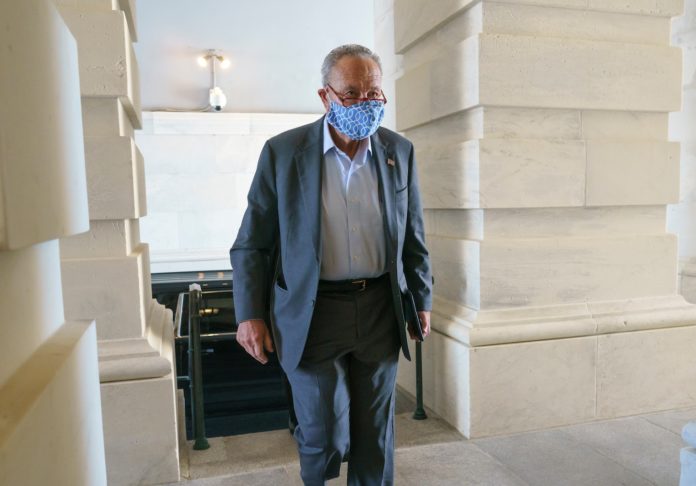
Medicare negotiation, Obamacare subsidies and out-of-pocket caps are all in Democrats’ new economic deal
There’s a new version of Democrats’ economic package. And this time, the measure sidesteps what would have been a major headache for them during the 2024 presidential election.
Instead of allowing extra Obamacare subsidies to expire at the end of that election year – which would hike health insurance premiums for some voters – the package would extend the subsidies for an additional year, through 2025.
It came as a surprise yesterday when Senate Majority Leader Chuck Schumer (D-N.Y.) and Sen. Joe Manchin III (D-W.Va.) unveiled a deal yesterday on a new spending package that aims to lower health care costs, combat climate change and reduce the federal deficit.
Earlier this month, Manchin appeared set on a two-year extension of key financial aid — set to run out at the end of the year — for Americans with health coverage through Obamacare’s insurance marketplaces. That would have meant roughly 13 million people would learn of hikes to their health insurance premiums just weeks before the presidential election.
But Manchin ultimately agreed to extend the enhanced financial help for three years through 2025. It’s a big sigh of relief for Democratic lawmakers who have long pledged to make health care more affordable and who feared campaigning amid price hikes.
Now, Senate Democrats are rushing to pass the latest iteration of the economic package — one that has Manchin’s seal of approval for the first time. Lawmakers shipped revised text to the arbiter of the Senate rules last night, and party leaders are aiming to try to advance the measure next week, Tony Romm, Jeff Stein, Maxine Joselow and I report.
- “I thank Senator Manchin for his willingness to engage and his commitment to reaching an agreement that can earn the support of all 50 Senate Democrats,” Schumer said in a statement last night.
More from Tony:
What’s in/out
For months, the negotiations between Schumer and Manchin have been clouded in secrecy, so much so that the deal was a shock to many Democratic lawmakers.
Just two weeks ago, the package was set to become a health-care-only bill, after Manchin said he wouldn’t support new climate or tax hikes on the wealthy. But now, the climate and tax hikes are back in, emblematic of the whiplash over the past year-plus.
When it comes to health care, the legislation revolves around two main policies.
- Democrats are set to get a win on drug pricing. The package allows Medicare to negotiate the price of select prescription drugs on behalf of seniors for the first time. It also further includes a $2,000 annual cap for seniors on their out-of-pocket spending for prescription drugs, forces drug companies to pay a rebate if they increase prices faster than the rate of inflation and more.
- As we mentioned earlier, the party will also continue to extend Obamacare’s enhanced financial aid. This is crucial for Democrats, who now also don’t have to contend with Americans learning that their health premiums would soon increase by potentially hundreds of dollars annually just weeks before the midterm elections.
In recent weeks, some rank-and-file Democrats and advocates were pushing hard for the inclusion of policies meant to help poor adults and low-income women. Here’s what the legislation excludes.
- Congress won’t extend Medicaid to 2.2 million adults. The policy would have expanded the safety net program in the dozen states where Republican officials have long refused the Affordable Care Act’s Medicaid expansion.
- The deal also doesn’t include provisions to boost coverage for new mothers. Previous iterations of the legislation included a policy to expand Medicaid to provide benefits in every state for a year after a woman gives birth.
Kaiser Family Foundation’s Larry Levitt:
$64 billion for the ACA would pay for a 3-year extension of enhanced premium assistance but not fill in the Medicaid gap in the dozen states that have not expanded coverage. https://t.co/6JsSNCKmZh
— Larry Levitt (@larry_levitt) July 27, 2022
Next steps
After the agreement was released yesterday, Schumer set about briefing members of his party on the legislation now called the Inflation Reduction Act of 2022 (we see what the Senate did here with that title).
Schumer said the goal is to vote on the legislation next week, though it’s not clear yet if the full Democratic caucus is on board. In a narrowly divided Senate, the party needs the support of all its members to pass the legislation without any Republican votes.
Meanwhile, the Senate parliamentarian must review whether all the policies are allowed under the budget maneuver that Democrats are using to circumvent GOP votes. The new text was sent for review last night.
On the other side of the Capitol … House Speaker Nancy Pelosi (D-Calif.) has her own razor-thin majority to contend with. The chamber is expected to leave for August recess at the end of the week, but return to Washington to vote if Senate Democrats pass their long-sought package.
Congressional Progressive Caucus:
For months, progressives have advocated for a reconciliation bill on policies with consensus across the Democratic Caucus: climate, health care, and tax fairness.
We’ll need to evaluate the details, but it’s promising a deal to deliver on those issues might finally be in reach.
— Progressive Caucus (@USProgressives) July 27, 2022
Biden administration expected to soon declare monkeypox a health emergency
The Biden administration is expected to declare monkeypox a public health emergency in the coming days as confirmed cases continue to climb across the country, Politico reports.
Such a declaration by the nation’s federal health department could potentially unlock a slew of new authorities to confront the rapidly spreading virus, including access to new money and appointing new personnel to oversee the country’s response, Politico’s Erin Banco and Adam Cancryn write.
Talks about whether such a declaration is warranted for monkeypox have been ongoing within the administration for days. Some officials have raised questions about the declaration given that the virus hasn’t been linked to a single confirmed U.S. death. Yet, cases are surging among gay and bisexual men, and some health officials say it’s necessary to help the government cut through red tape and better collect information about monkeypox’s spread, our colleague Dan Diamond reported earlier this week.
Yet, the decision isn’t final. Officials insisted to Dan last night that no decision has been made, though discussions are still active on the topic. An HHS spokesperson told Politico the agency “is continuing to explore options.” Xavier Becerra, head of the nation’s federal health department, is scheduled to hold a news conference on the virus this morning.
More from Dan:
Also: Officials tonight continue to insist no decision has been made on declaring a public health emergency for monkeypox, per four Biden administration sources. (Though discussions remain v active.)
Some background from Monday on the debate inside admin. https://t.co/auriw6Xuzx
— Dan Diamond (@ddiamond) July 28, 2022
Here’s the latest in monkeypox news:
- Effective Aug. 1, the Centers for Disease Control and Prevention will designate monkeypox as a nationally notifiable condition and will begin requiring states to report confirmed or probable cases of the disease within 24 hours, Politico reports.
- The FDA announced yesterday that it had completed the inspection of a Bavarian Nordic manufacturing facility in Denmark, freeing up more than 780,000 doses of the Jynneos monkeypox vaccine to be shipped to states after weeks of criticism from patient advocates and lawmakers, per Dan.
- The struggle over limited resources as tens of thousands of at-risk gay and bisexual men try to get vaccinated, tested and treated during the growing monkeypox outbreak has exposed deep inequities in the rollout of efforts to combat the virus, writes The Post’s Fenit Nirappil.
- In a shift in messaging, the head of the World Health Organization advised men who have sex with men, the group that’s been the most affected by the outbreak so far, to consider limiting their number of sexual partners to reduce their risk of contracting the virus, Stat reports.
WHO Director General Tedros Adhanom Ghebreyesus:
The #monkeypox outbreak can be stopped if countries, communities and individuals inform themselves, take the risks seriously, and take the steps needed to stop transmission and protect vulnerable groups.pic.twitter.com/7CumPFyPhc
— Tedros Adhanom Ghebreyesus (@DrTedros) July 27, 2022
On the Hill
First in The Health 202: Romney proposes new federal agency focused on public health data
Sen. Mitt Romney (R-Utah) this morning will unveil a proposal for the creation of a public health data agency aimed at providing real-time information to improve the country’s ability to respond to infectious diseases.
Romney’s proposal comes amid long-standing criticisms that federal health data is messy, incomplete and outdated, forcing public health authorities to rely on the United States’ decentralized and underfunded reporting system when shaping the country’s response to crises like the covid-19 pandemic.
“We have again seen the shortcomings as monkeypox has started to spread around the country,” Romney said in a statement. “These failures show the need for reliable, real-time data during days of blue-skies so we can better prepare for and potentially prevent major outbreaks.”
The Center for Public Health Data would be an independent sub-agency inside the Department of Health and Human Services. It would focus on efforts like streamlining and aggregating existing data across HHS and reporting daily data that would be accessible to all levels of government, hospitals, researchers and the public. It wouldn’t collect personally identifiable information or make public policy recommendations.
Meanwhile, on Capitol Hill …
- Senate Republicans thwarted an effort by Democrats yesterday to codify access to contraceptives into law through unanimous consent. House lawmakers passed companion legislation last week, our Post Politics Now colleagues report.
- House lawmakers overwhelmingly passed legislation last night to permanently extend several telehealth flexibilities under Medicare that were initially authorized during the covid-19 pandemic.
- After passing the PACT Act to extend health care and disability benefits for veterans exposed to toxic materials and burn pits last month, the Senate failed to advance an updated version of the legislation yesterday which lawmakers voted on again on after a technical error was corrected, Post Politics Now writes.
The response from Sen. Jon Tester (D-Mont.):
In other health news
- Abortion bans set to take effect this week in Wyoming and North Dakota were temporarily blocked yesterday by judges in those states amid lawsuits arguing the newly enforceable laws violate their state constitutions, the Associated Press reports.
- The Centers for Medicare and Medicaid Services launched its enhanced Nursing Home Five-Star Quality Rating System that includes staffing and turnover data yesterday in a bid to increase transparency and hold facilities to a higher standard of care for residents.
- President Biden tested negative for the coronavirus and said he’s “feeling great” after his bout with covid-19. He used the moment to urge other Americans to get vaccinated and boosted to increase the chances that their cases would be mild, too, if they contract the virus, our colleague Yasmeen Abutaleb reports.
More from Biden:
Because of my Administration’s investment in free booster shots, at-home tests, and effective treatments, today, we can protect ourselves from serious illness and prevent most COVID deaths.
COVID is still with us, but our fight against it is stronger than ever. pic.twitter.com/24toy7NiGR
— President Biden (@POTUS) July 27, 2022
Health reads
Sugar rush
Thanks for reading! See y’all tomorrow.








